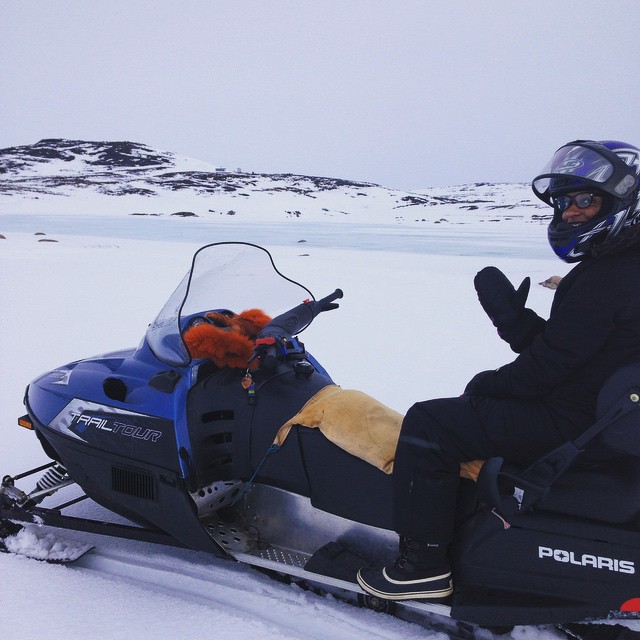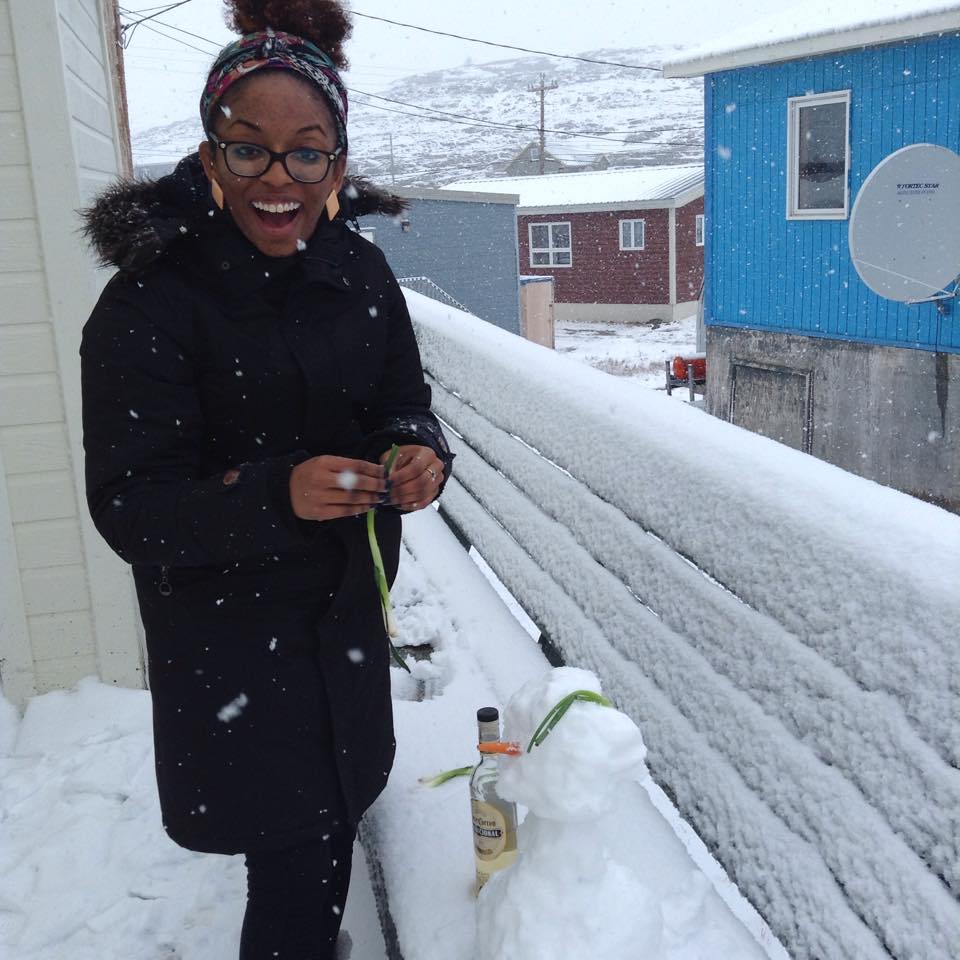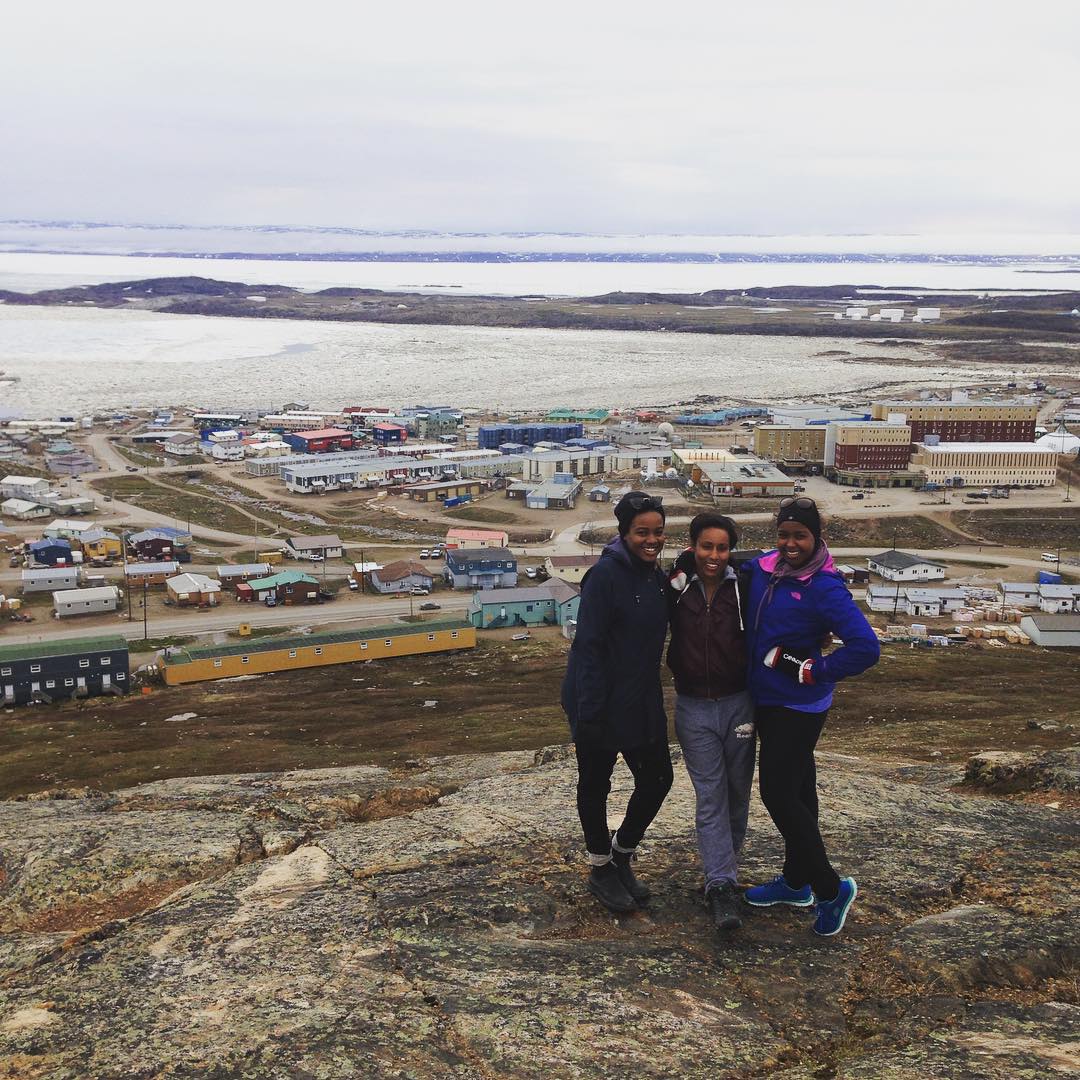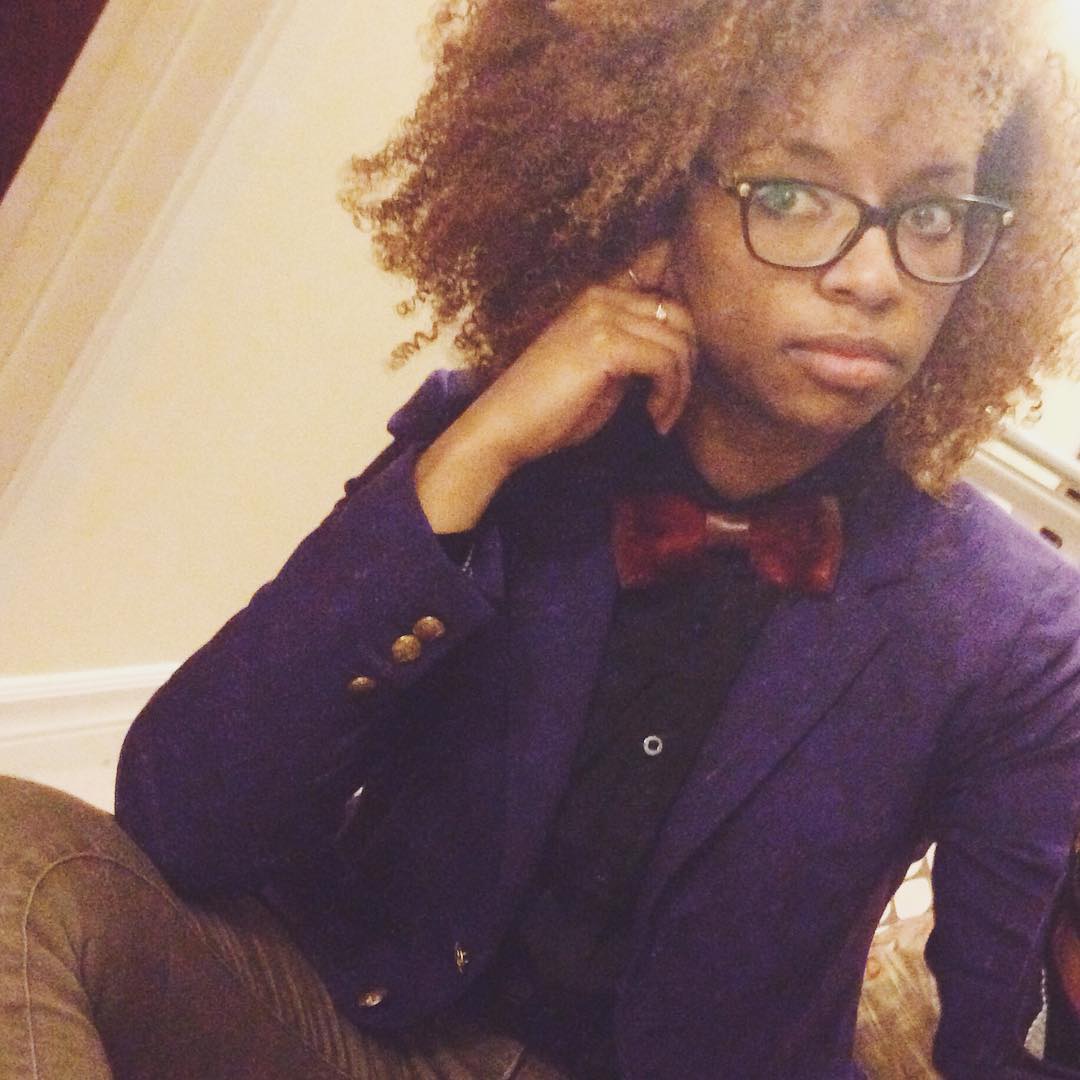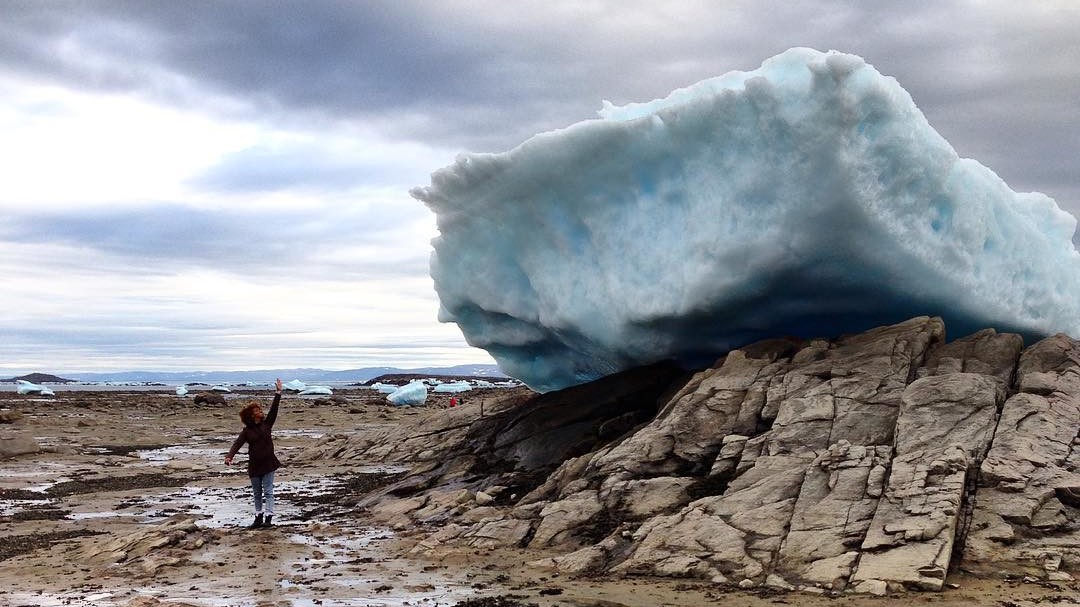
In Part 3 of Being Black in Iqaluit, I interview...a transient. *gasp* Meet Tammii T, a 25 year-old articling student who has been in Iqaluit for the last nine months. She grew up in Brampton, the daughter of Jamaican immigrants, before moving out to go to law school. Though her parentage is half-Indian, half-Black, she identifies her lived experience as that of a Black woman. This is another long interview, so let's just get into it!
FTN: So what actually brought you up here?
TAMMII: My articling job. It’s funny because, this wasn’t on my radar, at all. Before I came up here. The entire territory of Nunavut wasn’t on my radar. I’m doing better than a lot of people apparently because I knew Nunavut existed. I just didn't think that I was going to be coming up here.
And I think I had that same mentality as a lot of people I knew at home, where it’s the attitude like, well, there are no Black people up there. Like, that’s actually the number one question that I get from anyone, even if I don’t know you and I’m just meeting you, even if you're the person at the store where I'm buying my warm socks from, and you’re a skinny white dude - this actually happened, which is why I am going into so much detail - the first question you’re going to ask me is, are there Black people up there?
I did google, are there Black people in the Arctic? I actually googled that. That’s embarrassing, but yes it happened. And I am pretty sure the exact number was 0.1%. And so I thought I was going to be the only Black person up here. And then I got up here and the first five people I saw at the airport were Black! And then I had gone and made a blog that was called “Black Girl, White North” and then I felt like a fucking idiot. Because I was like, I’m not the only Black girl up here. It’s such a stupid blog. I actually was like, I have to delete my blog.
For the people who haven’t Googled it, are there Black people up here?
There are a lot, actually. In terms of the overall population, like the number of people who are in the city of Iqaluit versus the number of people who are Black people, there’s a lot! And it’s exciting. It’s an exciting thing to see.
There’s a perception of what a Black person is or is not capable of, and what a Black person is or is not comfortable with, and where a Black person can or cannot go. And it’s very evident from the fact that I, as a Black woman, thought that there were no Black people up here. The fact that everybody asks [if there are Black people up here], I think is very telling. Because nobody’s asking me, like, are there white people up there? The assumption is, of course there are white people up there. They’re everywhere. What about us? We actually are everywhere. So I think it’s really exciting.
I get that. I think a lot of times when people read the blog or when I get attention from other outlets, they are like, oh man, a South Asian woman who rides a snowmobile! And I’m like, this is because you believe that South Asian women are meek, and they make curry, but they’re not adventurous.
I can only judge so much, because I was one of those people, but at the same time you are a product of your environment, right? Nobody sees a Black girl on a snowmobile. That doesn’t happen. Even if the Black girl lives in Minnesota and everyone else is on a snowmobile, she’s the only one in a fucking car.
I don’t know if it’s because you all think we’re like, island people. But we are some adventurous people. Like, we are. We’ve made it through so much because we can adapt and change. And I think that that gets shoved under the rug in favour of popular media and popular media says that Black people don’t do anything in the snow. Like how many movies have you seen where the Black children are making a snowman outside? It’s ridiculous.
.I do take a perverse sense of joy whenever I tell someone, when I’m back down south, and I’m buying sweaters, or I’m shopping, and I’m like, I need socks for -40 degree weather, and they’re like, are you going skiing, and I’m like, no bitch! I live in the Arctic. It’s really fun. Broadening people’s awareness of what we’re capable of. Because we’re capable of fucking anything.
Have you faced discrimination or prejudice due to your race in Iqaluit?
I guess the biggest thing would be the hair. It’s the one thing that is specifically like, this wouldn’t be a conversation we would be having if this wasn’t a thing. But I don’t know necessarily that I've had direct comments to me that were a result of me being Black, or at least anything that I caught on to.
I don’t know if it’s in part because I’m selective about who I surround myself with. I think I’ve been fairly good at checking in with myself and figuring out, is this person someone that that is good for my mental well-being, my ability to exist. And so I think probably part of the reason why I haven’t had that many direct interactions anyway, that I’ve found highly problematic has been because of that decision to specifically pick and choose who I want to be around at what time.
Is that something that you are doing in Iqaluit, or is that something you would do anywhere?
Oh, I do that anyway. Yeah. I do that anyway. It’s a habit that I’ve developed in the last couple of years, and when I was going through law school especially. I started to really understand how, your experience as a racialized person, you can’t really divorce that from everyday interactions or from anything really. It’s always going to play in. And I came into that kind of late in the game. I’ve developed a habit of checking in with myself, before I got here.
It’s weird because like, as a transient person, you kind of inadvertently end up spending a lot of your time with other transient people, which I understand. I understand the difficulty of more permanent people who are living here getting really close to people who are just going to leave at the end of X amount of months or whatever.
I had a good friend who left after a couple of months and it was difficult. And we were very similarly positioned. We were both articling here, we both have the same mindset, she was another Black girl. She was kind of like, the person that I could blow off steam with. Even in terms of work stuff, or legal stuff or anything like that and I didn’t have to provide back story because we came from a similar position. And when she left it was really hard for me.
I don’t think I’ve ever been a position where I’ve felt unsafe or uncomfortable or scrutinized or anything because of my position as a Black woman. But I think in terms of coping with existence, so to speak, that is a lot more difficult when you haven't had the time to grow and nurture a base with people. I don’t want it to sound like I don’t have... I am very conscious of who i might be inadvertently hurting with what I am saying. It's not like that there’s not people; it’s just that the depth of conversation may not be the same and I need that. I rely on that to help me function. So for me as a transient, and as a Black person up here, that’s been my issue.
As someone who looks for that sense of community and that depth of connection, did you think about that moving up here?
I actually didn’t think about it. Which sounds very counterproductive and counterintuitive to everything that I just said. But I was so excited about coming up here and I thought, I really, really thought that I was going to be more ingrained with the local community than I currently am. Like, I really really believed in that.
I really believed that if you’ve moved up here, if you’ve lived up here, if you’re coming up here to work, you have to be so in tune with all of the issues of race relations and colonialist, settler legacy stuff and the socioeconomic imbalances and the precarious position of the justice system being imposed. You know what I mean? I thought everyone up here would be at a whole different level of understanding because of constantly existing in this world. That’s what I was expecting.
And have people met your expectations of being aware of settler ideology and the impact of colonization and the fact that we do live in a majority indigenous community?
It’s a mixed bag. I think for the large part, no. And I’m not going to say that my expectations were too high, because I don’t think they were. When I first got here - seems like a long time ago - I was unpleasantly surprised. And I don't know what it is and I feel so strange imposing my understanding on a situation that I’ve only got a snapshot of, but it kind of came across as a perma-vacation for some people.
I feel like there is a responsibility, especially because of the stark divide, there’s a responsibility to constantly check in with your positionality in a place like this. And I don’t think that happened as much as it should have, from the people that I was interacting with socially. For me that was a little bit strange.
What about with the local population, with Inuit. Have you had the opportunity to have those types of conversations?
Not really. No. But I think that’s once again, that's my fault. That part is my fault. Because like I said, when I came here, I thought that I was going to have this opportunity to really integrate myself into the local community and what ended up happening, not that I don’t love them, but I ended up surrounding myself with transients.
I haven’t really - I don't want to say had the opportunity because that's not it - I haven't really developed relationships with the Inuit population. And so there would be no opportunity to have that conversation. I think it is my fault because, you come here and you find these people that you're comfortable with and you’re okay with, and then that ends up being your norm. And you fall into that very quickly. And that tends to dictate who else you meet. And so the people you’re going to meet from that point on are the people that the people you hang out with meet. And so if the people that you hang out with are other transients who are only meeting new transients or non-Inuit individuals who have lived here or who have just moved here - I think that’s what ended up happening.
But you expected that you would make more local friends.
That’s something that I had thought was going to happen. I thought that was something that I was going to be able to do. I wouldn't be like the other transients! I’m not going to have only transient friends! I’m going to fully integrate myself into the community! And it just didn't happen and I think I kind of got exhausted and tapped out and was like, it is what it is.
Has living in Iqaluit, and having these experiences and these reflections, has it changed your own understanding of race and being racialized within Canada?
I think that this is the first time that I have been an observer. You’re not the target of the system, you’re not the target of the racialized comments, you're not the target of the stereotypes, you’re not the target of the condescension. You're not the target of any of that. You're just observing it happen. It’s almost like an out of body experience, because once you return home, you become, you as a part of a larger entity, become the target again. You’re the other. And that might just be my experience in the year that I was here. The experience of someone who’s been born and raised here as a Black person or who’s lived here for many years as a Black person might be incredibly different.
I think it’s an awakening of sorts, because you know to a certain extent, you know it's not just Black people. There’s a whole group of us that have similar experiences. And that’s not to take away from any individual group’s struggle. But I think you realize that there are similarities between how your group is treated and how this other racialized minority group is treated. And I think that’s very a powerful thing because you realize that the system, while it’s individual impact on each group might be slightly different, it interacts with each of us through a filter of non-whiteness. It kind of creates a sense of solidarity across those individual cultural lines.
And you’re not taking on someone else’s struggle as your own struggle, because you don’t really have the right to do that, but it hurts you more. Because you can see yourself and you can see your culture or your race or whatever in the way that other group is being treated, or that “other” is being treated. And I think it’s good. I think it’s a good hurt. I mean it’s a bad hurt, it’s a shitty hurt. When I say it’s a good hurt, it’s because it makes you feel more connected to that person or that group.
I think this is a good thing in terms of like, my identity or whatever. My identity as a Black woman is separate and distinct, but it is not disconnected from the identity or the experiences of Indigenous and Inuit women. Or a Southeast Asian woman. Or all the other racialized women. You’re each separate and distinct, but you are connected because you are experiencing similar things, just in different ways.
I don’t know if you feel this, how living in a place where the non-white culture is dominant, where from a very young age people take their non-white culture to be a sense of pride, is very inspiring for you to look at your own culture. Which is different from being a in a place where you’re expected to assimilate and act like a white person.
It is a beautiful thing. I didn’t even think of that because you just get so used to it. You get so used to the dominant culture being Inuit culture and everyone, for the most part, they’re assimilating into Inuit culture, kind of. It’s like, a weird thing to say.
Assimilating or appropriating?
A bit of both. That’s another weird thing that I can’t figure out. I can’t figure out how I feel about it. Because if it is assimilation, and the Inuit culture is the culture of Nunavut, that is not a bad thing. That’s a great thing. But then I think the imbalance comes from the fact that you can’t break away from the socioeconomic structure of the territory. You just can’t. It’s hard to separate those things.
To qualify, as a third, third, third, arm’s length party participant in the culture, I don’t know if what I’m saying is Inuit culture, is actually Inuit culture. I apologize if I sound like a complete idiot. But I acknowledge that I might sound like a complete idiot. Now I’m realizing that for me to be like, yeah, I’m experiencing Inuit culture all the time, I hang out with all the transients, but I’m always experiencing Inuit culture. It doesn’t make any sense. [laughs]
I think it’s cool to walk around and see qamotiks everywhere. Just little things, like seeing everyone wearing their parkas or their amautis, with the baby in the back, is normal. Like it ain’t no thing. You just get so used to hearing Inuktitut all the time. When I went down in November and it switched in Ottawa from Inuktitut to just English and French, I was like, what the fuck?
And then it’s like, am I being voyeuristic? Am I just binocularizing this culture and participating here and there? It’s a weird back and forth that’s always going back and forth in my mind.
Is that a bad thing?
No, I don’t think so. It’s just really exhausting. Woe is me.
I think it’s a good thing, because I feel like you’re confronted here, and you have to question yourself, because it’s so easy to just become so “Nunavut.” Homemade parka, sealskin everything. Ulu earrings. But do you really get it? Have you been invited?
That’s the thing. It’s good to ask those questions. And I don't know if everyone always has, when they come to Nunavut. I mean, I’m literally wearing ulu earrings right now. That’s a thing that’s happening. And I have my inukshuk necklace. Which I haven’t worn as much lately because I have had this kind of internal check. I’m like, oh my god.
You bought them off people who made them and are selling them as part of the wage economy. I don’t know...
But that is a conversation that I’ve had. It’s not that I’m necessarily trying to show, hey look at me, I’m super Nunavut. I do purchase jewellery no matter where I am. I don’t know if this is just how I am making myself feel better. But this is a thing that I do now matter where I go. Whether or not it’s problematic, I don’t know yet. But I haven’t worn my inukshuk necklace in a really long time. It’s beautiful. And I bought it on Nunavut Day. But I’ve just kind of been like, am I that person when I put that necklace on?
There’s a lot of unpacking that you have to do up here. And not like, the shit you bring up with you. It can be very exhausting. Especially if you’re not really used to having to unpack it, because you’re the targeted person and you just understand. But then you come up here and you’re not targeted, you’re not targeting, but you’re participating. You’re benefiting from the target and the targeting. So you have to. You have to unpack everything. Everything that you’re doing. Everything that you’re thinking. Every event that you go to. Every interaction that you have.
The way I’ve thought about it is, you can tell when you’re invited to participate in something. When people are selling something at a craft sale, it’s open to anybody to purchase. Whereas things like parka patterns, they’re not for sale. Somebody gives a parka pattern to you. But you can't buy them. It has not been commodified. And what’s so bad about an artist selling their work? And you’re not making ulu earrings and selling them.
So I think, as the non-settler, non-settled, but participating people who are coming up here, we have to trust Inuit to make that decision about what’s for sale and what isn’t. And that’s all we can do. And then we just keep asking these questions.
Also, I hope somebody comments on this and they’re like, it’s okay for you to wear ulu earrings.
Please, someone validate me so that I can do this! Because otherwise I’m going to keep feeling guilty.

